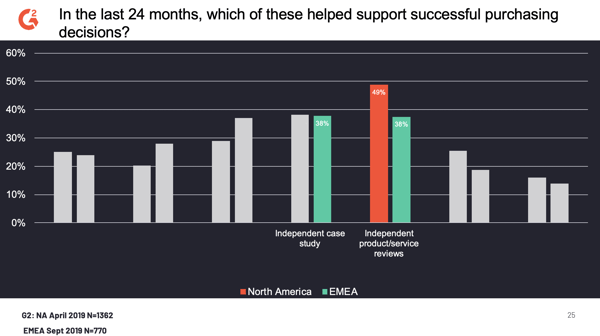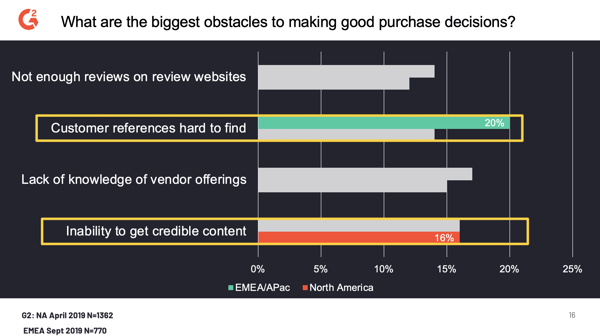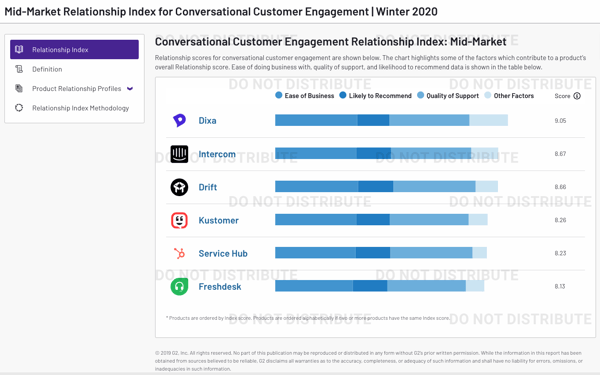What do business leaders need to make the best, data-driven technology purchasing decisions and ensure they achieve their business goals?
Technology, particularly software, is a critical to building and growing a modern, competitive business. And if that's true, it puts an incredible amount of pressure on choosing which solutions to buy and implement. (It’s also broader than simply the tech question. The potential working relationship with the seller is also important, particularly with cloud products where an ongoing subscription defines the commercial relationship.)
Understanding buyer behavior
To better understand this process, G2 Research conducts an annual survey on buyer behavior. The 2019 edition surveyed 2,132 buyers and buyer influencers across all industries, focused on North America and EMEA. (View the North America study here.) The survey examines the full decision lifecycle to gain insight into what information—and which information sources—B2B buyers find trustworthy and significant.
What is considered “normal” for B2B buying and selling has changed; with the availability of independent online information sources, buyers feel empowered to incorporate these new sources of information into the decision-making process. The challenge for buyers, though, is to find the most relevant, trustworthy, and contextual information sources available, while cutting through the noise and clutter of the online world.
Where do tech buyers turn for information?
As a technology buyer this won’t come as a surprise, but seller-sponsored content and seller sales personnel are not the first stop for most of today's buyers. According to the survey, 44% of North American buyers and 61% of EMEA buyers reported that they usually engage a vendor sales professional only when they have already made the purchase decision. Yet 55% of North American and 64% of EMEA buyers reported that they appreciated vendors that contact them with relevant and contextual information about products and services. (The key, of course, is the relevant and contextual part. Most of us welcome a seller's outreach if it happens when the outreach relates to an issue that we are trying to solve at the same time.)
When asked about information sources that have helped to support successful purchasing decisions over the past 24 months, it was obvious that independence and credibility were extremely important.

What makes the tech purchasing process difficult for buyers?
With so much information available online, what obstacles do buyers experience when attempting to make successful purchasing decisions? The survey respondents identified a variety of issues, including both a lack and a distrust of industry-specific information as well as difficulties achieving internal alignment. The most frequently cited issues included content credibility, lack of knowledge about available solutions, and not finding enough online reviews. This final obstacle—cited by 12% of North American buyers and 14% of EMEA buyers—is crucial. The number of B2B buyers that rely on reviews has climbed over the past few years; 82% of North American buyers and 80% of EMEA buyers reported using online review sites to find information and recommendations to support purchasing decisions.

Modern technology means modern delivery models
Making a purchasing decision for cloud software has another dimension that most information sources don’t necessarily address. Being in a long-term relationship with a seller—a service relationship—is very different from the old model of perpetual licenses. There was maintenance and support, of course, but the operation of the infrastructure to support the software was not part of that relationship.
In the cloud, meanwhile, quality of service and the ability to effectively manage the ongoing relationship are crucial aspects to consider before making a purchasing decision. One way for buyers to gain insight during the purchasing process is through G2's Relationship Index reports. These reports, comprising data from verified user reviews, provide a side-by-side comparison of vendors in a particular category, helping buyers determine the products and vendors that would best fit their business needs.
-
Ease of doing business with the supplier
-
The likelihood of the reviewer recommending the supplier/solution
-
Quality of support
-
Additional data that helps assess the reviewers relationship with the revised seller
 Example of G2 Relationship Index report
Example of G2 Relationship Index report
The future of informed buying in B2B tech
Online research is nothing new for buyers looking to make personal purchases, and neither are peer review sites such as Yelp and TripAdvisor. At the same time, there are many online information sources available to support successful B2B purchase decisions—maybe too many, at times. Cutting through the noise to discover the most contextual and relevant information—that is also trustworthy—can be difficult. Unbiased, independent information is very important to buyers, and we should see a continued reliance on credible sources in the future.



 by Michael Fauscette
by Michael Fauscette
 by Michael Fauscette
by Michael Fauscette
 by Michael Fauscette
by Michael Fauscette